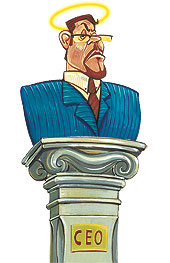 |
| Illustration: Uday Deb |
When Apple Computers (now Apple Inc) made a huge marketplace splash with its iPod, equity research house Morgan Stanley upgraded its rating on the company to “overweight”. The reason, said Morgan Stanley, was that people were so enthused with their iPod experience that they would buy Macs instead of PCs. A survey it had conducted amongst iPod owners showed that 19 per cent of them (who also owned PCs earlier) had purchased a Mac in the past year. This figure was expected to rise to 25 per cent.
“It’s called the Halo Effect,” says Mumbai-based HR consultant Shashi Rao. “The technical definition is the extension of an overall impression of a person or organisation to influence the total judgment of that person. The effect is to evaluate an individual high on many traits because of a belief that the individual is high on one trait.”
In his book The Halo Effect: ... and the Eight Other Business Delusions that Deceive Managers, author Phil Rosenzweig says that blind belief in a person’s all-encompassing excellence is a lot of hogwash. It’s part of the many managerial myths that B-schools propagate (see box).
In India, where the family is still a cornerstone of Corporate India, the Halo Effect is even more pronounced. Every publication worth its salt comes out with an annual list of the most-respected companies, the most-influential CEOs, the best employers and other adulatory variants of these themes.
The problem is not so much with these studies and surveys as the fact that the heroes so chosen are deemed perfect. It is apparently permissible to take potshots at a company. But don’t you dare do the same to a CEO. Almost every CEO in India surrounds himself with a circle of loyalists and yes men. They will put you and your organisation on their hitlist.
How does it matter if such CEOs are projected as God’s gift to the world? The answer is that there are too many people who are easily taken in. In the workplace, executives make every attempt to emulate their heroes. And the chances are that they could go down some wrong roads too.
Take a prominent CEO whose aspiration today is to become President of India at some stage. With this in mind, he has been making several populist statements. But the rest of industry, particularly the sector he operates in, is aghast at his pronouncements. Because of his stature, he is regarded as some sort of a spokesperson. And the government has been only too willing to use his utterances to impose fresh taxes and what have you.
Super CEO 2 is as miserly as they make them. He tracks the consumption of toilet rolls in his company’s loos. If everyone in this country had been like him, India’s GDP growth rate would have been a fraction of what it is today.
Super CEO 3 is ready to party at the drop of a beer can. Sure, he has the money. No one, except the Leftists, should grudge him his pleasure. But should all of us be emulating him?
Or take Super CEO 4. He has emasculated all possible successors from within the ranks of the company. With no one to take over his mantle, his board has perforce to extend the statutory retirement age. In the past, we have seen such CEOs stick to power even in their dotage. The company goes down the drain, but the megalomaniac refuses to ride into the sunset.
“The lesson for all executives is to have a healthy dose of cynicism,” says Rao. “At any given time, you’ll probably have just a couple of real corporate icons. The rest are creations of PR departments and the media. Even the genuine ones are never perfect.”
But when Indians heroworship someone, they can see no flaw in him or her. It may not be a recipe for disaster. But it is only through dissent and discussion that you are aware of the dangers before you are in the middle of them.
THINK TWICE
Managerial myths
The Halo Effect: Many performance drivers are simply attributions based on prior performance.
The Delusion of Correlation and Causality: Two things may be correlated but we may not know which is the base cause.
The Delusion of Single Explanations: Many explanations are highly correlated; the effect of each one is less than suggested.
The Delusion of Connecting the Dots: It is difficult to isolate the reasons for success. There is no way of comparing them with less successful companies.
The Delusion of Rigorous Research: If the data is not good, it does not matter how sophisticated the research methods appear to be.
The Delusion of Lasting Success: Almost all high-performing companies regress over time.
The Delusion of Absolute Performance: Company performance is relative, not absolute.
The Delusion of the Wrong End of the Stick: Highly-focused companies are often successful, but not always.
The Delusion of Organisational Physics: Company performance does not obey the laws of nature and science.
Source: The Halo Effect: ... and the Eight Other Business Delusions That Deceive Managers, by Phil Rosenzweig










